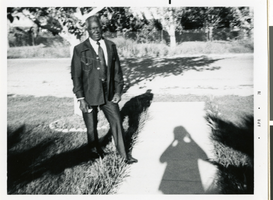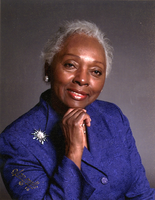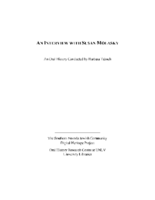Search the Special Collections and Archives Portal
Search Results

Lee Henry Lisby: photograph
Date
Archival Collection
Description
Black and white photograph of Lee Henry Lisby in a residential neighborhood.
Image

Portrait photograph of Ruth Eppenger D'Hondt, circa 2010
Date
Archival Collection
Description
Color portrait photograph of Ruth Eppenger D'Hondt, circa 2010.
Image
Las Vegas African American Community Conversations round table interviews
Identifier
Abstract
The Las Vegas African American Community Conversations is a four-part conversation with local Las Vegans. The first part of the round table is moderated by Trisha Geran with a central theme of "Migration, Work and Community Emergence." The panelists discuss the early history of the African American community in Las Vegas, Nevada. They also discuss how and why their families moved to Las Vegas, most citing the economic opportunities as a major factor. The participants share their personal histories and family histories building up the African American community in downtown Las Vegas and the Westside. The second part of the round table is moderated by Sonya Horsford with a central theme of "Education, Economy, and Integration." The panelists discuss the Clark County School District pre- and post-integration. They discuss the hardships of the Sixth Grade Center Integration Plan on the African American community as well as discussing the differences in the school facilities. The round table participants also discuss the social services and social programs and the history of those programs from the African American perspective. They also discuss civic involvement and the various civic groups started by the panelists, and share discrimination they faced.
The third part of the round table is moderated by Claytee D. White with a central theme of "Civil Rights and Entertainment." The panelists discuss the racism and segregation present in Las Vegas and discuss how African American community leaders worked to integrate African Americans into the Las Vegas community. They discuss the 1969 riots in detail, and discuss African American entertainers and the entertainment industry. They share personal experiences working in the entertainment industry and discuss the importance of the local unions, such as the Culinary Workers Union Local 226, the International Alliance of Theatrical Stage Employees Local 720, and their contributions to the unions. The fourth and final part of the round table is moderated by Rachel Anderson with a central theme of the "Early African American Legal Community." The panelists discuss the foundations of the professional legal community in Las Vegas, noting the contributions of Charles Keller, Dr. William Bailey, and the Reverend Marion Bennett as driving forces for civil rights activism in Las Vegas. They share their experiences growing up in Las Vegas facing discrimination and segregation. Lastly, they share the changes they have seen and how both the legal and African African communities have grown.
Archival Collection

Transcript of interview with Susan Molasky by Barbara Tabach, March 11, 2014
Date
Archival Collection
Description
In this interview, Susan Molasky discusses her childhood and teenaged years growing up in London, where she worked with in a fabric store. Molasky shares photos and momentos with the interviewer, and talks about originally coming to Las Vegas with her first husband, Leo Frey, in the late 1950s. She discusses raising her children in Las Vegas, and her bout with ovarian cancer, which prompted her involvement in Nathan Adelson Hospice. She continues to discuss her life with second husband, Irwin Molasky, and the causes they are involved in.
Susan Molasky was born in Israel (what was then-Palestine) in mid-1930s, the daughter of Bukharian Jewish immigrants. With the end of World War II, at the age of nine Susan, her sister and mother were able to get visas to live with her father in London. It was in England where Susan learned English and began working, at a fabric shop on Regent Street. In 1957, Susan married her first husband, and the couple moved to Las Vegas on January 1, 1958. She knew immediately that the city would be her home. Susan and her husband moved to Las Vegas to help her brother-in-law, Leo Frey, renovate and manage the Moulin Rouge; their primary business was long-term room rentals to casino employees, occasionally renting to tourists when the casino hotels were full. After two years, her husband changed careers paths and the couple moved to Europe. They had three sons before returning to Las Vegas in 1964. In 1973, Susan married Irwin Molasky, whom she had met through her work with the Sisterhood at Temple Beth Sholom; both sat on the temple's board. Susan enjoyed the excitement and glamour that defined Las Vegas during the 1970s, attending show openings, visiting movie sets, and socializing with stars. But more than this, Susan devoted herself to helping others, most notably through the opening of Nathan Adelson Hospice. Her own battle with cancer, as well as serving as a caretaker for others, ignited her commitment to establish quality hospice care in her beloved city, and she has continuously led the organization's fundraising efforts. There are now two Nathan Adelson Hospice facilities serving the greater Las Vegas area.
Text
Audio clip from interview with Elaine Galatz, April 23, 2015
Date
Archival Collection
Description
Part of an interview with Elaine Galatz on April 23, 2015. In this clip, Galatz describes how she became involved with the Jewish Federation of Las Vegas as president.
Sound
Audio clip from interview with Ron Lurie, June 5, 2015
Date
Archival Collection
Description
Ron Lurie talks about winning a seat on the Las Vegas City Council, and the voting population of the city.
Sound
Audio clip from interview with Sonja Saltman, August 18, 2015
Date
Archival Collection
Description
In this audio clip, Sonja Saltman describes coming to the United States, and to Las Vegas, in the 1970s.
Sound
Ronald and Rosemary Thome Collection of Goldfield, Nevada Postcards
Identifier
Abstract
The Ronald and Rosemary Thome Collection of Goldfield, Nevada Postcards contains three postcards from around the 1950s to the 1970s depicting Goldfield, Nevada. The postcards portray three paintings of life in Goldfield around the turn of the twentieth century.
Archival Collection
Merle and Beulah Frehner Photograph Collection
Identifier
Abstract
The Merle and Beulah Frehner Photograph Collection contains photographs of Southern Nevada from 1905 to 1955. The materials include photographs of the Frehner freight teams transporting ore, schools and students in the Moapa Valley, the Colorado River, and parades in Southern Nevada.
Archival Collection
American Dental Association
Bio taken from Wiki: "The American Dental Association (ADA) is an American professional association established in 1859 which has more than 155,000 members. Based in the American Dental Association Building in the Near North Side of Chicago, the ADA is the world's largest and oldest national dental association and promotes good oral health to the public while representing the dental profession. The ADA publishes a monthly journal of dental related articles named the Journal of the American Dental Association."
Corporate Body
